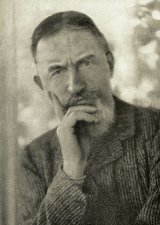Pygmalion Page #8
Pygmalion is a play by George Bernard Shaw, named after a Greek mythological figure. It was first presented on stage to the public in 1913. In ancient Greek mythology, Pygmalion fell in love with one of his sculptures, which then came to life.
PICKERING. Excuse me, Higgins; but I really must interfere. Mrs. Pearce is quite right. If this girl is to put herself in your hands for six months for an experiment in teaching, she must understand thoroughly what she's doing. HIGGINS. How can she? She's incapable of understanding anything. Besides, do any of us understand what we are doing? If we did, would we ever do it? PICKERING. Very clever, Higgins; but not sound sense. [To Eliza] Miss Doolittle-- LIZA [overwhelmed] Ah--ah--ow--oo! HIGGINS. There! That's all you get out of Eliza. Ah--ah--ow--oo! No use explaining. As a military man you ought to know that. Give her her orders: that's what she wants. Eliza: you are to live here for the next six months, learning how to speak beautifully, like a lady in a florist's shop. If you're good and do whatever you're told, you shall sleep in a proper bedroom, and have lots to eat, and money to buy chocolates and take rides in taxis. If you're naughty and idle you will sleep in the back kitchen among the black beetles, and be walloped by Mrs. Pearce with a broomstick. At the end of six months you shall go to Buckingham Palace in a carriage, beautifully dressed. If the King finds out you're not a lady, you will be taken by the police to the Tower of London, where your head will be cut off as a warning to other presumptuous flower girls. If you are not found out, you shall have a present of seven-and-sixpence to start life with as a lady in a shop. If you refuse this offer you will be a most ungrateful and wicked girl; and the angels will weep for you. [To Pickering] Now are you satisfied, Pickering? [To Mrs. Pearce] Can I put it more plainly and fairly, Mrs. Pearce? MRS. PEARCE [patiently] I think you'd better let me speak to the girl properly in private. I don't know that I can take charge of her or consent to the arrangement at all. Of course I know you don't mean her any harm; but when you get what you call interested in people's accents, you never think or care what may happen to them or you. Come with me, Eliza. HIGGINS. That's all right. Thank you, Mrs. Pearce. Bundle her off to the bath-room. LIZA [rising reluctantly and suspiciously] You're a great bully, you are. I won't stay here if I don't like. I won't let nobody wallop me. I never asked to go to Bucknam Palace, I didn't. I was never in trouble with the police, not me. I'm a good girl-- MRS. PEARCE. Don't answer back, girl. You don't understand the gentleman. Come with me. [She leads the way to the door, and holds it open for Eliza]. LIZA [as she goes out] Well, what I say is right. I won't go near the king, not if I'm going to have my head cut off. If I'd known what I was letting myself in for, I wouldn't have come here. I always been a good girl; and I never offered to say a word to him; and I don't owe him nothing; and I don't care; and I won't be put upon; and I have my feelings the same as anyone else-- Mrs. Pearce shuts the door; and Eliza's plaints are no longer audible. Pickering comes from the hearth to the chair and sits astride it with his arms on the back. PICKERING. Excuse the straight question, Higgins. Are you a man of good character where women are concerned? HIGGINS [moodily] Have you ever met a man of good character where women are concerned? PICKERING. Yes: very frequently. HIGGINS [dogmatically, lifting himself on his hands to the level of the piano, and sitting on it with a bounce] Well, I haven't. I find that the moment I let a woman make friends with me, she becomes jealous, exacting, suspicious, and a damned nuisance. I find that the moment I let myself make friends with a woman, I become selfish and tyrannical. Women upset everything. When you let them into your life, you find that the woman is driving at one thing and you're driving at another. PICKERING. At what, for example? HIGGINS [coming off the piano restlessly] Oh, Lord knows! I suppose the woman wants to live her own life; and the man wants to live his; and each tries to drag the other on to the wrong track. One wants to go north and the other south; and the result is that both have to go east, though they both hate the east wind. [He sits down on the bench at the keyboard]. So here I am, a confirmed old bachelor, and likely to remain so. PICKERING [rising and standing over him gravely] Come, Higgins! You know what I mean. If I'm to be in this business I shall feel responsible for that girl. I hope it's understood that no advantage is to be taken of her position. HIGGINS. What! That thing! Sacred, I assure you. [Rising to explain] You see, she'll be a pupil; and teaching would be impossible unless pupils were sacred. I've taught scores of American millionairesses how to speak English: the best looking women in the world. I'm seasoned. They might as well be blocks of wood. I might as well be a block of wood. It's-- Mrs. Pearce opens the door. She has Eliza's hat in her hand. Pickering retires to the easy-chair at the hearth and sits down. HIGGINS [eagerly] Well, Mrs. Pearce: is it all right? MRS. PEARCE [at the door] I just wish to trouble you with a word, if I may, Mr. Higgins. HIGGINS. Yes, certainly. Come in. [She comes forward]. Don't burn that, Mrs. Pearce. I'll keep it as a curiosity. [He takes the hat]. MRS. PEARCE. Handle it carefully, sir, please. I had to promise her not to burn it; but I had better put it in the oven for a while. HIGGINS [putting it down hastily on the piano] Oh! thank you. Well, what have you to say to me? PICKERING. Am I in the way? MRS. PEARCE. Not at all, sir. Mr. Higgins: will you please be very particular what you say before the girl? HIGGINS [sternly] Of course. I'm always particular about what I say. Why do you say this to me? MRS. PEARCE [unmoved] No, sir: you're not at all particular when you've mislaid anything or when you get a little impatient. Now it doesn't matter before me: I'm used to it. But you really must not swear before the girl. HIGGINS [indignantly] I swear! [Most emphatically] I never swear. I detest the habit. What the devil do you mean? MRS. PEARCE [stolidly] That's what I mean, sir. You swear a great deal too much. I don't mind your damning and blasting, and what the devil and where the devil and who the devil-- HIGGINS. Really! Mrs. Pearce: this language from your lips! MRS. PEARCE [not to be put off]--but there is a certain word I must ask you not to use. The girl has just used it herself because the bath was too hot. It begins with the same letter as bath. She knows no better: she learnt it at her mother's knee. But she must not hear it from your lips. HIGGINS [loftily] I cannot charge myself with having ever uttered it, Mrs. Pearce. [She looks at him steadfastly. He adds, hiding an uneasy conscience with a judicial air] Except perhaps in a moment of extreme and justifiable excitement. MRS. PEARCE. Only this morning, sir, you applied it to your boots, to the butter, and to the brown bread.
Translation
Translate and read this book in other languages:
Select another language:
- - Select -
- 简体中文 (Chinese - Simplified)
- 繁體中文 (Chinese - Traditional)
- Español (Spanish)
- Esperanto (Esperanto)
- 日本語 (Japanese)
- Português (Portuguese)
- Deutsch (German)
- العربية (Arabic)
- Français (French)
- Русский (Russian)
- ಕನ್ನಡ (Kannada)
- 한국어 (Korean)
- עברית (Hebrew)
- Gaeilge (Irish)
- Українська (Ukrainian)
- اردو (Urdu)
- Magyar (Hungarian)
- मानक हिन्दी (Hindi)
- Indonesia (Indonesian)
- Italiano (Italian)
- தமிழ் (Tamil)
- Türkçe (Turkish)
- తెలుగు (Telugu)
- ภาษาไทย (Thai)
- Tiếng Việt (Vietnamese)
- Čeština (Czech)
- Polski (Polish)
- Bahasa Indonesia (Indonesian)
- Românește (Romanian)
- Nederlands (Dutch)
- Ελληνικά (Greek)
- Latinum (Latin)
- Svenska (Swedish)
- Dansk (Danish)
- Suomi (Finnish)
- فارسی (Persian)
- ייִדיש (Yiddish)
- հայերեն (Armenian)
- Norsk (Norwegian)
- English (English)
Citation
Use the citation below to add this book to your bibliography:
Style:MLAChicagoAPA
"Pygmalion Books." Literature.com. STANDS4 LLC, 2025. Web. 9 Jan. 2025. <https://www.literature.com/book/pygmalion_78>.




Discuss this Pygmalion book with the community:
Report Comment
We're doing our best to make sure our content is useful, accurate and safe.
If by any chance you spot an inappropriate comment while navigating through our website please use this form to let us know, and we'll take care of it shortly.
Attachment
You need to be logged in to favorite.
Log In